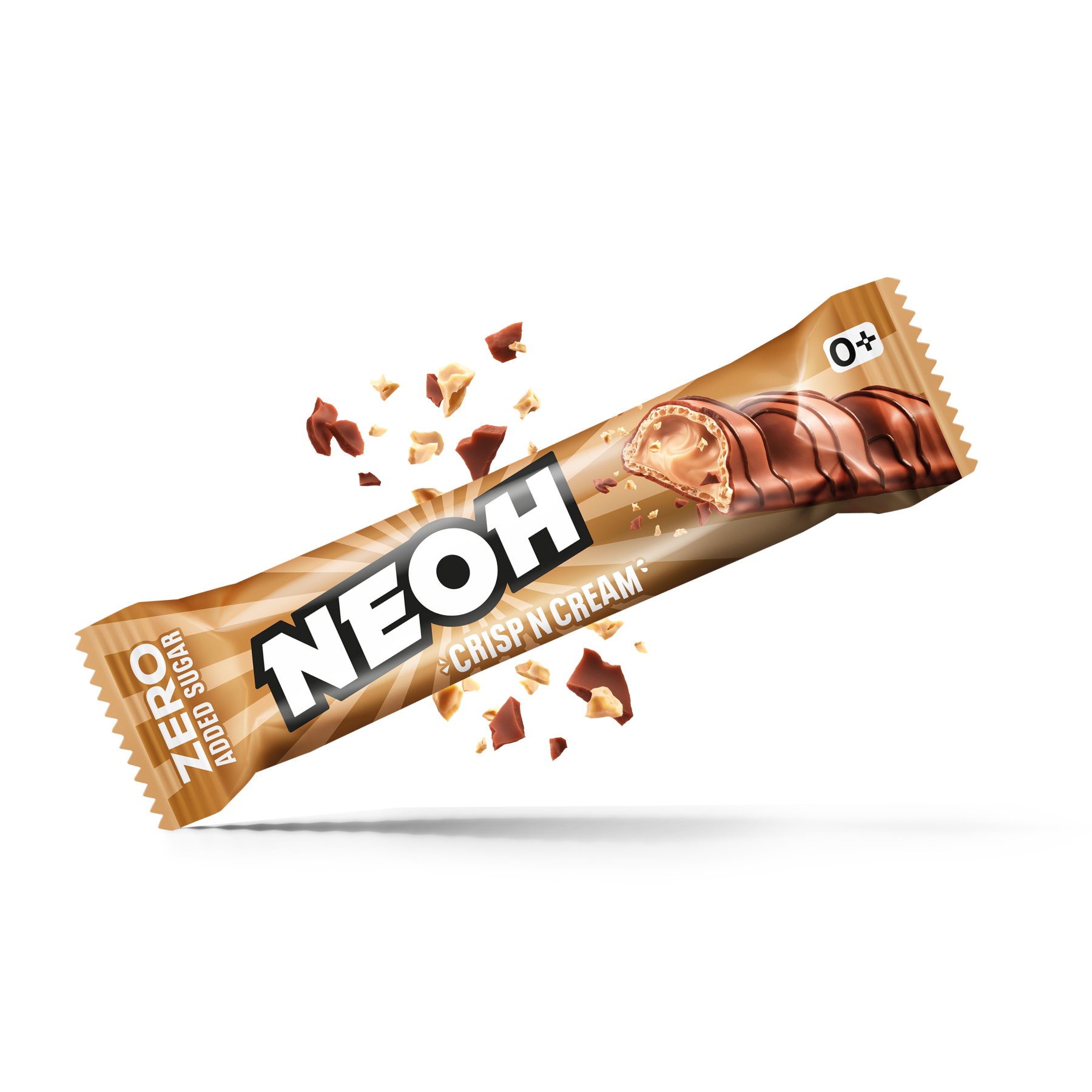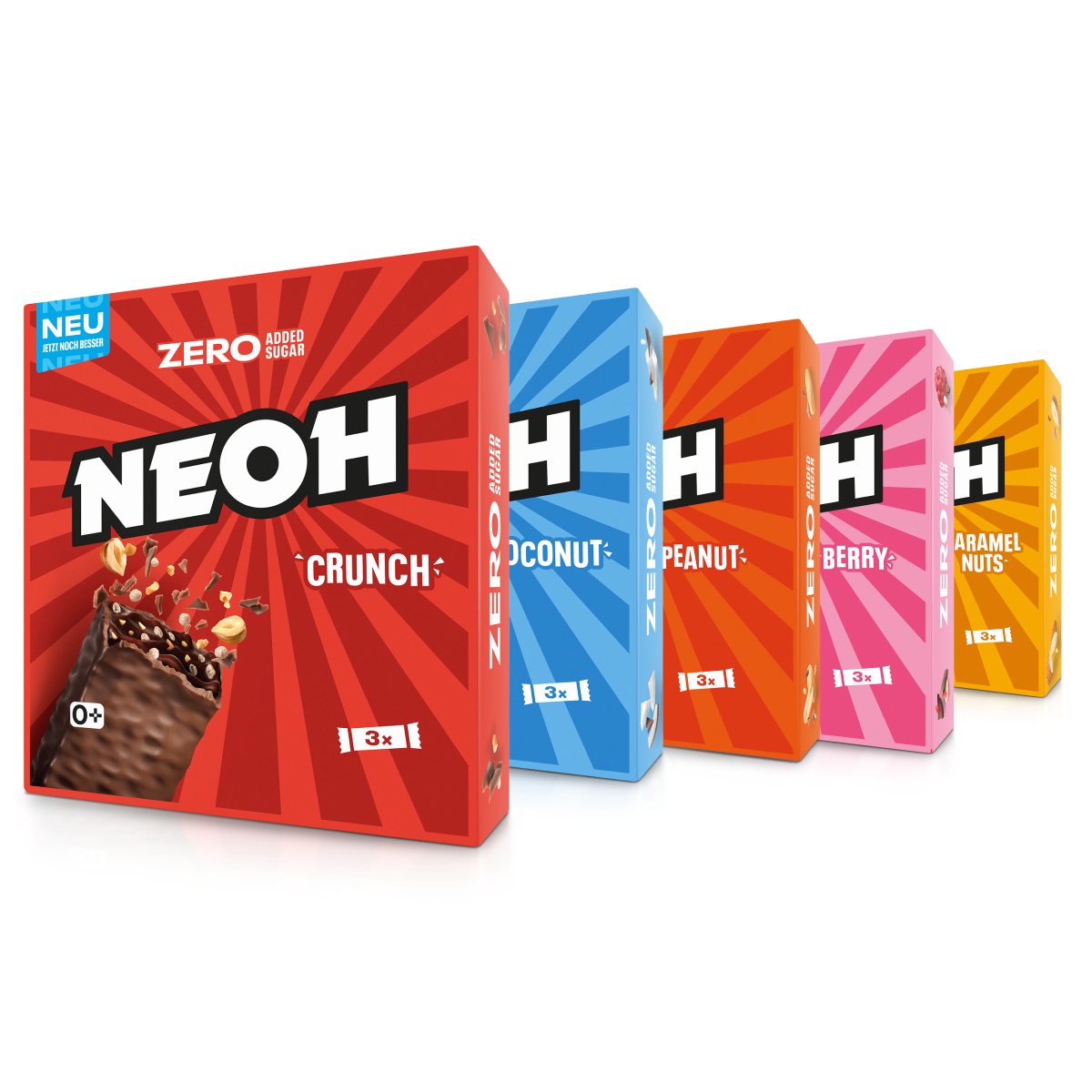THE NEOH WAY OF SNACKING
THE NEOH WAY OF SNACKING
We want to sustainably revolutionize snacking!
NEOH not only tastes good but is also good for our planet and the living beings that inhabit it. We are especially uncompromising on these issues:
ZERO sugar added!
Here are a few facts that will surely make the sugar stick in your throat. The World Health Organization (WHO) recommends limiting daily sugar intake (added and also natural sugar in fruits and honey) to 5% of total calories. (cf. WHO Guideline, 2015) Why? Because sugar intake has already been recognized as a key risk factor for overweight and type 2 diabetes as well as heart diseases. (cf. Debras et al., 2020, p. 1) Sugar in its various forms glucose, fructose, and sucrose also plays a central role in the development of caries. (cf. Wölnerhanssen, 2020, p. 483) More information on the health effects of sugar consumption can be found HERE.
It's no coincidence that there are already countries that have resorted to drastic measures like a sugary drink tax to reduce consumption, which has even achieved success. However, the raw material sugar is still an inexpensive filler and helps food manufacturers make their products tastier. (cf. ibid, p. 480)
Moreover, as early as 2009, it was proven in rats that sugar is just as addictive as heroin and cocaine. The German naturopath Inke Jochims even goes so far as to claim "Sugar is a drug." (cf. https://www.foodaktuell.ch)
An absolute NO GO for NEOH.
ZERO palm oil!
Palm oil is not only the cheapest but also the most popular fat in the food industry. (cf. Fabricius, p.1) But why don't we use it? For us, it's clear because we don't want to make money by causing deforestation of the rainforest and damaging the entire global climate. (cf. ibid.) Furthermore, the habitat of many animals and plants is endangered or destroyed during palm oil production. (cf. Wegmann, 2019, n.p.) Therefore, we completely refrain from including palm oil in the formulation of our products.
The health effects on humans should not be overlooked either, as palm oil has a much higher percentage of saturated fatty acids compared to other vegetable oils, which should rather be avoided. A study by Sun et al. (cf. 2015) shows, among other things, that the consumption of palm oil can lead to side effects such as increased mortality from ischemic heart diseases or an increased risk of cardiovascular diseases. It has also been proven that palm oil significantly raised LDL cholesterol compared to other vegetable oils with a lower content of saturated fatty acids. HDL cholesterol levels also increased due to palm oil consumption. (cf. ibid.)
Want to learn more about palm oil? Then read the following article from Greenpeace HERE. After that, palm oil will no longer be on your menu, promised!
Reduced plastic waste!
We avoid plastic wherever possible and where it makes sense in terms of sustainability. One reason is that plastic, due to its ubiquity combined with its durability, leads to problems in our environmental system, especially in the form of microplastics. And you can now find it almost everywhere in the world – in the pack ice of the poles, in the seas, or even as fine dust in our air. (cf. Florides/Lenk, 2020, p. 13)
You can find more information HERE to read up on.
Whether it's shipping our bars and merch or our promotional materials. Our bars will also soon get more sustainable packaging without you, our customers, having to pay extra for it. To ensure that the quality of our bars does not suffer from inferior but sustainable packaging, we have been working for years on a solution that satisfies us in both areas.
Our #NEOHlogic
In summary, our principle is: If everyone is doing well, then we are doing well too. That is why we treat our customers, partners, and employees the way we ourselves would like to be treated and eliminate short-sighted or egocentric approaches from our actions. We also always pay attention to our partners' sustainability standards when selecting them.
For example, as the manufacturer of our merch, we chose Continental Clothing - one of the leading manufacturers in terms of ethically responsible production, which represents, among other things, the following social responsibility principles: No child & forced labor, safe working conditions, living wages, and no discrimination against employees.
We want to show that if we all live a little more consciously, not only will our diet improve, but much more besides.
Let’s do this together! Be the change you want to see in the world!
Sources:
Charlotte Debras, Eloi Chazelas, Bernard Srour, Emmanuelle Kesse-Guyot, Chantal Julia, Laurent Zelek, Cédric Agaësse, Nathalie Druesne-Pecollo, Pilar Galan, Serge Hercberg, Paule Latino-Martel, Mélanie Deschasaux, Mathilde Touvier (2020): Total and added sugar intakes, sugar types, and cancer risk: results from the prospective NutriNet-Santé cohort; In: The American Journal of Clinical Nutrition; https://doi.org/10.1093/ajcn/nqaa246
World Health Organisation (WHO) (2015): Sugars intake for adults and children: Guideline. Geneva. http://public.eblib.com/choice/publicfullrecord.aspx?p2033879.
Wölnerhanssen, Bettina K. (2020): Refined Sugar – Valuable Energy or Physiological Nonsense? In: Quintessennz Dentistry, Issue 5, pp. 480-487
https://www.foodaktuell.ch/2009/01/06/versuche-mit-ratten-zucker-macht-suechtig/, abgerufen am 20.10.2020
Fabricius, Tatjana (2019): Climate Killer Palm Oil - Limits and Possibilities of Private Policy Networks in Global Environmental Politics. Wiesbaden: Springer Fachmedien Wiesbaden GmbH; https://doi.org/10.1007/978-3-658-28012-3
Wegmann C. (2020) Ethical Food Marketing. In: Food Marketing. Springer Gabler, Wiesbaden. https://doi.org/10.1007/978-3-658-26038-5_7
Sun, Ye; Neelekantan, Nithya; Wu, Yi; Lote-Oke Rashmi; Pan, An; van Dam; Rob M (2015): Palm Oil Consumption Increases LDL Cholesterol Compared with Vegetable Oils Low in Saturated Fat in a Meta-Analysis of Clinical Trials. In: J. Nutri, pp. 1549-58
Völker, Carolin; Kramm, Johanna; Sattlegger, Lukas; Zimmermann, Lisa; Bentheimer, Patrick; Elfers, Franziska; Florides, Paula; Feilberg, Nils; Feucht, Viktoria; Holzer, Theresa; Höfner, Katharina; Lenk, Kevin; Malcherowitz, Kira; Munder, Wolf; Rahmer, Judith; Savelyeva, Sofiya (2020): Socio-ecological excursion "Plastic in the Environment." pp. 1-97

